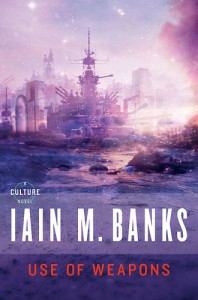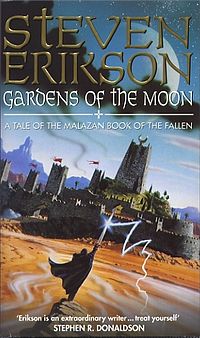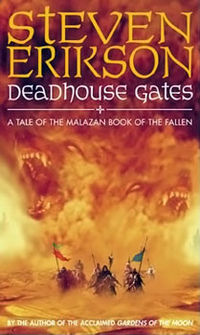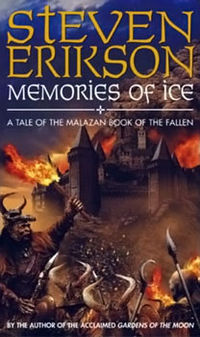Use of Weapons by Iain M. Banks
 Use of Weapons (Culture Series)
Use of Weapons (Culture Series)
by Iain M. Banks
Orbit; Reprint edition, July 2008
512 pages / $15.99 Buy from Amazon
The Culture series by Iain M. Banks just keeps on getting better and in Use of Weapons, the narrative takes on added complexity in a two-pronged narrative that intertwines the tale of a hunter, Zakalwe, who has left the Culture and a woman, Sma, who still works for them. I’d go so far as to say this is one of the most experimental works by Banks, or for that matter, any science fiction writer, particularly in light of the ending. Because of its added intricacy, I (PTL) invited Joseph Michael Owens (JMO) and Kyle Muntz (KM) to collaboratively review the book and share/debate/spur our thoughts in a “cultural” exchange.
Peter Tieryas Liu: What was your take on Zakalwe and Sma in the pantheon of Culture characters?
Joseph Michael Owens: To be honest, Cheradine Zakalwe and Diziet Sma are probably two of my very favorite Culture characters overall, and I’m currently reading the last book in the series. The chemistry between them is truly fantastic. It’s hard to explain without giving away major spoilers, but you’ve got a really fantastic setup where you can see there is a great detail of history between them and it’s 100% believable. You can feel that they know each other incredibly well and, in some situations, they’re really the only ones that can handle each other.
Banks is also good with layering characters’ roles, and you get the feeling that both Zakalwe and Sma have done and seen a lot that doesn’t necessarily have to do with their current occupations, which I love. I think it adds an extra human element to the characters, these two specifically, because we’re shown that they exist — and have existed — outside of this single narrative. And since they feel like people and thus read like people.
The ending is . . . it’s just wow. . . .
Kyle Muntz: I’m not sure I can add too much to Joe’s comments (since I think that’s totally on-base and right), but in retrospect, I’d say Diziet Sma in particular has really stuck with me. The Culture series has a lot of strong female characters, but Sma is definitely one of the most interesting and best realized. For me, one thing the experimental elements of the novel call attention to (by telling Zakalwe’s story forwards and backwards at the same time) is how broad life is; and how separate different episodes in it can be. Especially when the chronology is destabilized. The novel gives glimpses of the same people, years apart–and each time they seem different, sometimes almost unrecognizable. And that’s life.
Use of Weapons is the last Culture novel to focus on a small cast of characters. After this, it becomes a sequence of vaguely Pynchonian ensemble pieces, and while I love the broader scope that brings to the series, it makes me appreciate the more intimate characterizations of the earlier novels, especially this and Player of Games. Characterization wise I think Banks is in top form here. In general, every Culture novel is unique, but formally none of them stand apart as strongly as Use of Weapons.
PTL: One of the most interesting chapters is when Banks’ describes Zakalwe’s first time aboard a Culture ship, Size Isn’t Everything. It’s our first real exposure from the eyes of a newcomer to how different the Culture is from everything we know, particularly with a post-scarcity economy in which anyone can do what they want.
One of the dialogues I remember is a waiter who talks about what’s important in life and why he enjoys wiping tables when he can do anything he wants: “I could try composing wonderful musical works or day-longer entertainment epics, but what would that do? Give people pleasure? My wiping this table gives me pleasure. And people come to a clean table, which gives them pleasure. And anyways, people die; stars die; universes die. What is any achievement, however great it was, once time itself is dead?” What do you guys think about the Culture? Things you like and dislike?
JMO: I remember Banks saying once that he modeled the Culture off of his ideal utopia, which is kind of cool because that’s an example of the power of writing and creativity: you can literally create your own world, and then go play in it! There’s really nothing I dislike about the Culture; I’m like the ultimate Culture fanboy. The way I’ve read it since book 1 (Consider Phlebas) is that a pan-human race created AIs that were able to perpetuate and evolve themselves into the Minds we know and love in current Culture novels. The AIs basically take care of all the mundane activities for humans so that humans can dedicate themselves to whatever they want: art, recreation, education, various experiences in general. Disease has been eradicated in the biological citizens, and people can augment themselves any number of ways they desire for utility or for fun. This sounds totally like a place I’d want to live!
KM: There’s a certain amount of tension within the novels about the Culture, mostly questioning how such a powerful, secular, completely free, post-violence, post-scarcity society (controlled entirely by machines) should interact with violent, oppressive, warfaring societies who rule themselves and do a terrible job of it. But I think the Culture is objectively pretty perfect.
I read the series over a year ago now, but it was the setting that kept me coming back: the Culture, endless, unchanging, as a place to live and way of life to be explored. Genre fiction tends to treat society as something to be moved: societies fight war, are saved from corruption, whatever. Which I’ve always thought was boring, and pushes me away from series like Song of Ice and Fire. Instead, the Culture is basically incorruptible and one of the most intellectually sound utopias in fiction. (Another good example is Triton by Samuel Delany.) There are elements of the setting I still think about pretty regularly, and in retrospect even echo through a novel I wrote called The Holy Ghost, which was about a utopian-ish society that did have to deal with scarcity.
Another main tension is always going to be that the Culture isn’t run by people — it’s run by machines infinitely smarter and, yes, more humane than we’ve ever been. This isn’t something I’d want to dive too deeply into, other than to say: I don’t really see the problem.
PTL: The contrast between the Federation (e.g.) in Star Trek and the Culture is fascinating in that while both are postscarity, the latter embraces human nature to an extreme while the Federation espouses a future in which human nature is transcended. Sma is casual about her sexual liaisons with crew members and all hints of traditional morality are banished, whereas in the Federation, conservative values are still very prevalent. But the biggest difference is that the Minds run the Culture whereas the Federation has a council that is susceptible to corruption. So in that sense, the Culture could not exist if it weren’t for the Minds and Artificial Brains that are in control. Beychae, the target of Zakalwe’s chase, poses an interesting thought: “The Culture believes profoundly in machine sentience, so it thinks everyone ought to, but I think it also believes every civilization should be run by its machines.” Zakalwe replies: “I have no idea whether they’re the good guys or not… They certainly seem to be, but then who knows that seeming is being? I have never seen them be cruel, even when they might have claimed they have an excuse to do so. It can make them seem cold, sometimes. But there are folks that’ll tell you it’s the bad gods that always have the most beautiful faces and the softest voices.”
In some ways, these “Artificial” Minds are the future gods, albeit quirky and eclectic ones. Do you think there’s an assumption by Banks that humans can’t achieve this totally peaceful society by their own means and need someone else in control? For all practical matters, if there were a master species of aliens that were also benevolent, they could easily take the place of the Minds in the fiction (though that probably would have been harder to swallow for human readers who would equate it to human slavery).
JMO: I like the Minds-as-future-gods idea because to us, they would be, especially given that they (i.e. the Culture) are a level 8 civilization. However, there are also level 9 and 10 civs out there (10 being those civs that have Sublimed, if I recall), who are ostensibly gods even to the Culture and other level 7-8 civs. This is something you are even given an example of in the final Culture novel, The Hydrogen Sonata, when one Mind talks to another that has actually returned to “the Real” from the Sublime (something that is almost unheard of).
Also, I got this from a wiki: “Also significant within the Culture novel cycle is that the book shows a number of Minds acting in a decidedly non-benevolent way, somewhat qualifying the godlike non-corruptibility and benevolence they are ascribed in other Culture novels. Banks himself has described the actions of some of the Minds in the novel as akin to “barbarian kings presented with the promise of gold in the hills”.”
I think the idea is that, once Sublimed, you are fully actualized within the greater universe. One of the feelings you get, however, is that Subliming is something civilizations also do when they — for lack of a better term — get bored, and decide simply to “retire.”
To go with your main question, I think as long as there is a sense of “us” and “them,” or more specifically, “the other” — and as long as there are resources that are not available to everyone — it will be incredibly hard for humans to achieve such a totally peaceful society by their own means. Humans are inherently opportunistic, even when they have the best intentions. As long as someone else has something you want, you’ll likely experience some level of envy. Oftentimes the sense of envy will be manageable, but what happens when it’s not, i.e. in situations where what you want involves feeding starving people? Of course that’s a base need versus simple want, but when resources become scarce, the line gets blurry.
December 30th, 2013 / 11:00 am
The First Three Books of The Malazan Book of the Fallen Series: A Primer and Review
The Malazan Book of the Fallen Series:
Gardens of the Moon (1999), Deadhouse Gates (2000), Memories of Ice (2001)
by Steven Erikson
One of the main hurdles epic fantasy has had to overcome has been making inroads with the literary crowds. However, in his piece “Easy Writers” for The New Yorker, Arthur Krystal observes that “the distinction between genre fiction and literary fiction has, of late, gotten less clear. Writers we once thought of as guilty pleasures are being granted literary status.” In a response to Krystal’s article, Lev Grossman wrote in a piece for Time that:
We expect literary revolutions to come from above, from the literary end of the spectrum — the difficult, the avant-garde, the high-end, the densely written. But I don’t think that’s what’s going on. Instead we’re getting a revolution from below, coming up from the supermarket aisles. Genre fiction is the technology that will disrupt the literary novel as we know it.
I think everyone can agree that good writing is good writing, irrespective of genre. Admittedly, for a while — particularly while I was in grad school — I’d been turning my nose up at sci-fi and fantasy (SF/F), ignoring the fact that the main reasons I wanted to become a writer in the first place were rooted in those two genres. Only upon closer inspection did I discover sub-genres, hidden within the minutia of those broad, overarching designations, particularly “epic-” or “high-fantasy” and “hard science fiction,” terms — similar to “surrealism” and “postmodernism” in that the practitioners of of each basically cringe at the labels — that showed me I was on the right track for discovering guilt-free SF/F reading that was also . . . dare I say it? . . . literary!
Gardens of the Moon opens with the armies of the Malazan Empire battling the free native city-states for dominance. It’s during an attempt by the Bridgeburners, one of the Malazans’ elite military units, to seize control of Darujhistan that we pick up the plotline. Epic events quickly begin to unfold from there.
Though it’s been mentioned around bookish corners of the Internet before, it certainly does bear repeating: do not expect much in the way of setup in Gardens of the Moon — Erikson sends you hurtling, face-first, into the Malazan universe where upon you land directly in the middle of the significant conflict I mentioned above. It can be a disorienting, even jarring experience. While the threat of an impending invasion by an oppressive empire seems like a bad thing, you still aren’t completely sure who to root for; you can’t definitively say who is “good” and who is “bad” (a distinction, like in Martin’s novels, that becomes increasingly more blurry as the series progresses); you are never totally sure of the stakes.
You just know shit is about to go down.
July 8th, 2013 / 11:00 am



